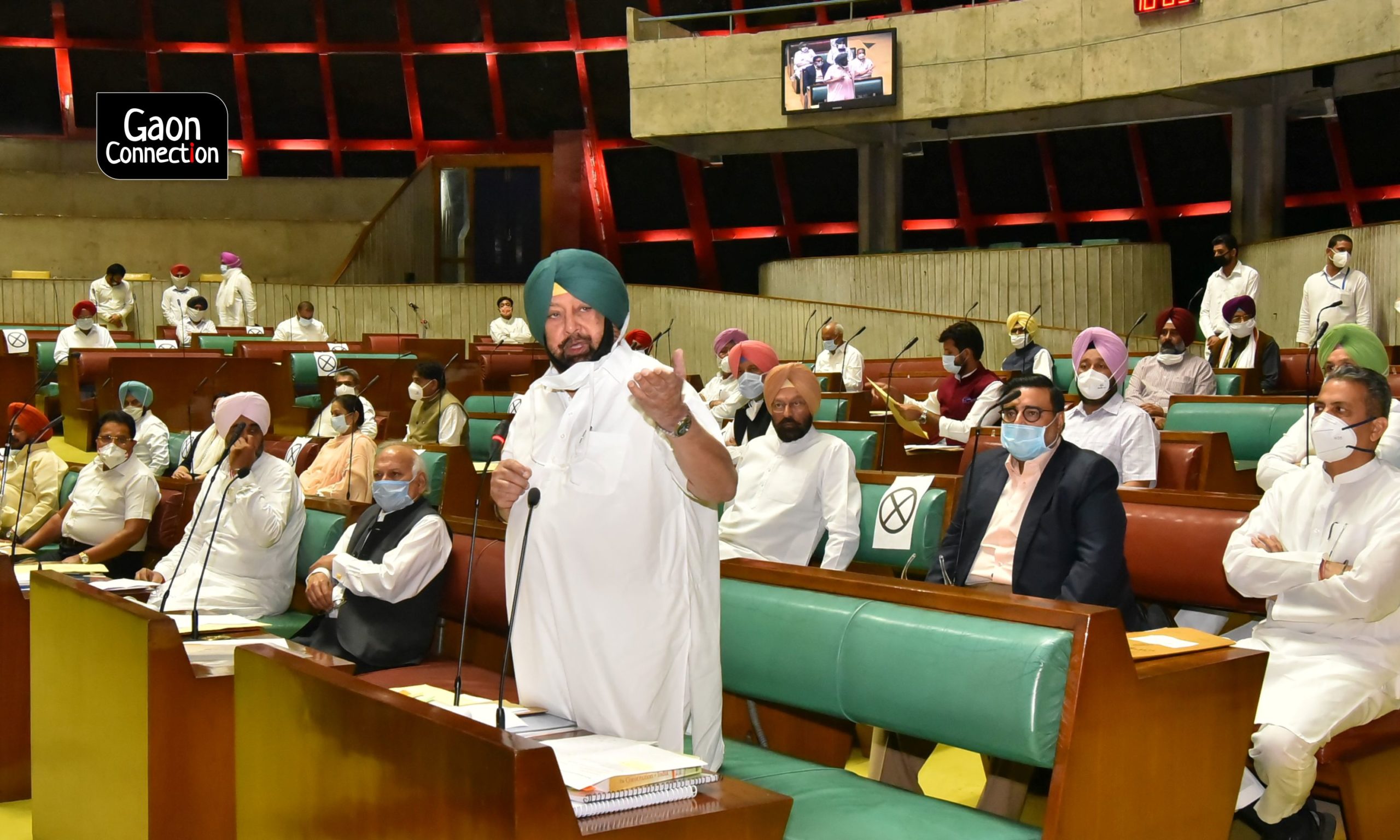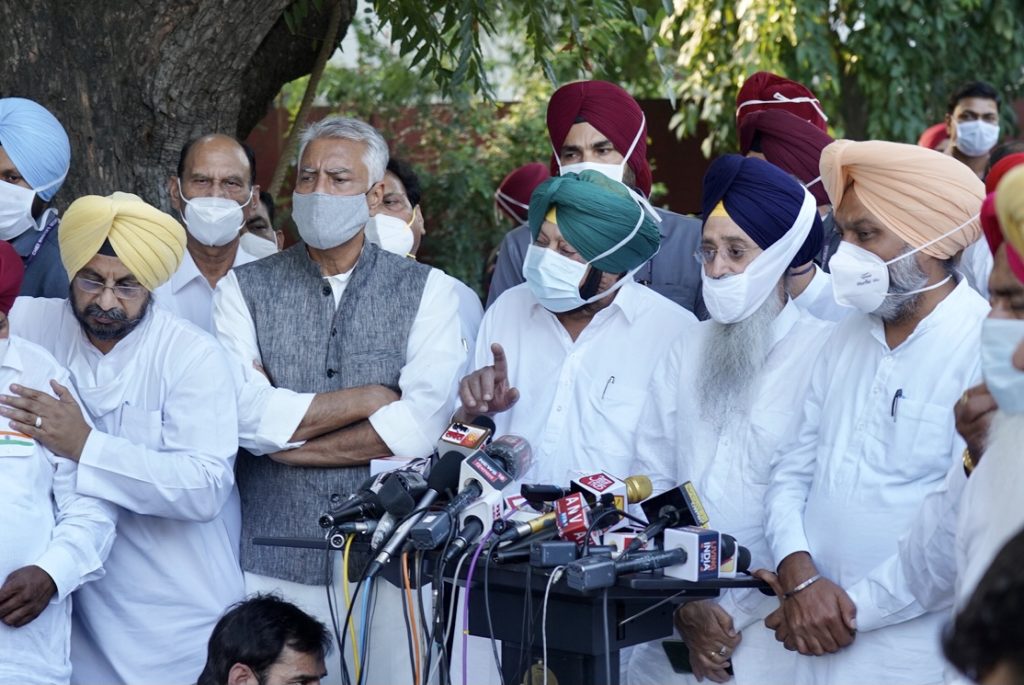Can farm bills passed by Punjab sidestep Central agri laws? Legal opinion divided
Some legal experts say agriculture being a state subject, Punjab has the authority to enact its laws. Others say instead of overriding central legislation, Punjab should approach the Supreme Court.


Punjab assembly passed four farm bills on October 20. Pic: By arrangement
In a major development that could trigger a fresh row over the Centre’s recent agriculture laws that have led to strong farmer protests, Punjab, on October 20, became the first state whose legislative assembly unanimously passed four bills, three of which counter the Centre’s new agri laws, introduced last month. Among other things, these bills make buying of wheat and paddy below the minimum support price (MSP) a punishable crime in the state. There is also a provision to levy a fee on corporate houses making purchases outside mandis. The fee will be used for the welfare of farmers.
These bills have been drafted taking into consideration all the major grievances raised by different farmer unions in the past month, and to protect the interest of the state’s wheat and paddy farmers, all of whom sell their produce at MSP. Both the BJP members of legislative assembly (MLAs) were absent when these bills were passed.
After the house proceedings, Amrinder Singh, the state chief minister, led a delegation with members from the Aam Aadmi Party and Shiromani Akali Dal and called upon Punjab governor VP Singh Badnore. He urged Badnore to accord his assent to the bills at the earliest. The chief minister also gave him a copy of the resolution passed in the assembly. The BJP legislators stayed out of this too.
“This is the best thing that has happened for Punjab,” the chief minister said in the press conference after meeting the governor. He said the basic idea behind these bills was to save farmers, landless workers and the time-tested MSP system. “The entire country’s farming operations cannot be put into peril by weakening an age-old system,” he said, and hoped that the Centre would not scuttle the voice of Punjab.
While Amrinder Singh seems confident about the four new bills passed by the assembly, legal opinion on the validity of these bills, and their ability to bypass the Central agri acts, is divided. On the one hand are legal experts who claim the state has the right to protect its farmers by bringing in legislation. On the other are subject experts who inform that the state needs to go through proper redressal mechanisms, and not jump in with new laws.

Legal tussle?
After the passing of the bills, Punjab Advocate General Atul Nanda told the media that the state rightly enacted these bills to protect its farmers as it fell within its legislative competence. Moreover, agriculture is a state subject under which the state has full authority to enact its own laws. Even if they are construed to be in conflict with central laws, Punjab’s bills can still prevail by virtue of their assent by the President of India, said Nanda.
However, Chandigarh-based advocate Mohan Jain, former additional solicitor general for the Supreme Court, told Gaon Connection that no state government could override any central legislation passed by Parliament. If states had an issue with the new laws, they could file their representation with the central government or move the Supreme Court and question their constitutional validity, he added.
According to him, the state has no power to negate central acts by way of its own separate laws. “The consequences are numerous if such things happen. There can be President’s rule too,” he said, claiming that Punjab’s recent move would also set “a bad precedent” and many states might want to pass their own laws. “There are remedies available in case anyone feels there is irregularity in the central act, but enacting their own laws in contravention with central legislation cannot be done constitutionally,” he warned.
At a press conference after meeting the governor, when asked about the possibility of the Centre imposing President’s rule in the state to scuttle the attempts to negate the new farm laws, chief minister Amrinder Singh said, “Let’s wait and see. We will move step by step.” However, if the situation came to such a pass, he said he was carrying his resignation letter in his pocket and would hand it over willingly, rather than compromise on the interests of Punjab and its farmers.
There are reports coming in that in case the governor does not give his assent to the bills, the state government plans to approach the Supreme Court of India.

According to Hamir Singh, a senior journalist based in Chandigarh, Punjab’s move will exert pressure on other states, especially Haryana, that has a similar MSP-based procurement system. The state is ruled by a BJP-Jannayak Janta Party (JJP) alliance headed by Dushyant Chautala. “While the tenability of Punjab’s bills can’t be predicted right now, it will definitely start a nationwide debate to provide legal sanctity to the MSP system,” Hamir Singh told Gaon Connection. He added that the new agri laws were passed without consulting states.
It is also being hinted that Punjab’s move may put BJP-JJP alliance in Haryana under strain as there will be pressure on Chautala to follow Punjab’s path, while the BJP will be against the move.
The bills recently passed by the Punjab assembly are: The Farmers Produce Trade and Commerce (Promotion and Facilitation) Special Provisions and Punjab Amendment Bill, 2020, which makes sale and purchase of farmers’ produce compulsory under MSP. The
Agreement on Price Assurance and Farm Services (Special Provisions and Punjab Amendment) Bill, 2020, makes it compulsory that there would be no sale or purchase of wheat or paddy under any farming agreement unless the price paid for such agriculture produce is not lower than MSP. It also calls for a three-year jail term for violators.
The third bill, The Essential Commodities (Special Provisions and Punjab Amendment) Bill, 2020, gives the Punjab government powers to regulate production, supply, distribution and stock of cereals and pulses. Thus, it overrides the central act that takes some items off the essential commodities list.
Besides these, the state assembly passed the fourth bill, Amendments to the Code of Civil Procedure, 1908, to protect farmers with land holdings up to 2.5 acres [one hectare] from kurki (attachment of property upon unpaid loans) in any recovery proceedings.

MSP, the core issue
In Punjab and Haryana, two states with an efficient Minimum Support Price (MSP) system, all stocks of paddy and wheat are bought at MSP, and any dilution is seen as a threat to farmers’ existence. This explains why the strongest protests against the new agri bills are also taking place in these two states. “Unlike Bihar and other states, every grain of paddy and wheat has always been procured under MSP in Punjab. That is why farmers are agitating the most here, because they fear being left at the mercy of market forces,” said RS Ghuman, professor of economics at the Chandigarh-based Centre for Research in Rural and Industrial Development.
Ironically, there is a mixed response among farm organisations for the new bills passed by the state assembly. Jagmohan Singh, general secretary of farmers’ association Bhartiya Kisan Union-Dhakunda, told Gaon Connection the bills passed in the Punjab assembly signified the victory of their month-long struggle. However, left-leaning farmers’ organisations are in a wait-and-watch mode. Sukhdev Kokri of the Bhartiya Kisan Union-Ugraha, which has been spearheading protests against the bills, said it had to study the bills before issuing a statement.
Ghuman of the Centre for Research in Rural and Industrial Development, termed the passing of the bills a correct move, and a bold one. However, whether they will be upheld in future is to be seen. “But, what the state has done is stand in solidarity with farmers by ensuring the continuation of MSP, and giving it legal sanctity,” he told Gaon Connection.
Sources said the ball is in the Punjab governor’s court now. He can reject these bills or refer them to the President of India. An official communication from the governor’s office is awaited. The state government is also getting battle-ready to face any legal complications, the chief minister has said.
On October 21, Amarinder Singh told media he was confident that Punjab governor will refer these bills to the President of India for assent. In case, there is a rejection, the state has plenty of legal options. As per the procedure, President can seek opinion from the Union cabinet before taking any decision. Sources said that all these things may take a lot of time, therefore it can’t be said with certain that changes made by Punjab in central legislation will see light of the day in near future.

